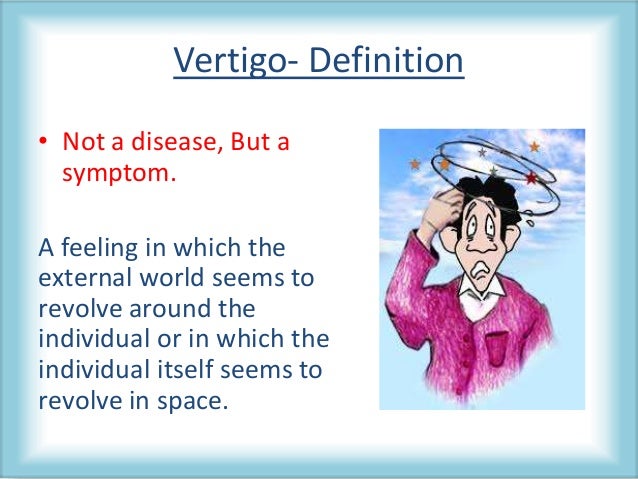Vertigo Causes Treatment Illnesses Conditions Nhs Inform

Vertigo Facty
Vertigo is the sensation that either your body or your environment is moving (usually spinning). vertigo can be a symptom of many different illnesses and disorders. the most common causes of vertigo are illnesses that affect the inner ear, including:. Vertigo is a specific type of dizziness that is characterized by the sudden sensation that you are spinning or that the world around you is spinning. the feeling can come and go or it can last for. Dec 12, 2020 · vertigois a sensation of feeling off balance. if you have these dizzy spells, you might feel like you are spinning or that the world around you is spinning.
Vertigo Causes Symptoms And Treatments
Noun. Call your doctor if you have a new episode of vertigo, especially if it is associated with headache and significant coordination problems. also call if you have mild vertigo that persists after a couple a definition vertigo days.
9 remedies for vertigo facty health.
Vertigo Wikipedia

9 Remedies For Vertigo Facty Health
Powered by oxford dictionaries. Your doctor will diagnose vertigo based on your description of what you are feeling. vertigo can be divided into two major categories, peripheral vertigo and central vertigo. peripheral vertigo, which is much more common, includes benign positional vertigo, labyrinthitis and ménière's disease. positional vertigo is diagnosed when moving the head causes the vertigo and returning the head to a neutral position relieves symptoms. labyrinthitis and ménière's attacks usually come on abruptly and la Your doctor may begin treatment by recommending bed rest or prescribing medications that suppress the activity of the inner ear, such as meclizine (antivert, bonine and other brand names), dimenhydrinate (dramamine) or promethazine (phenergan); anticholinergic medications such as scopolamine (transderm-sco); or a tranquilizer, such as diazepam (valium). depending on the cause and duration of the vertigo, additional advice may be offered. for benign paroxysmal positional vertigo, your doctor m Medical definition of vertigo 1 : a sensation of motion which is associated with various disorders (as of the inner ear) and in a definition vertigo which the individual or the individual's surroundings seem to whirl dizzily — see objective vertigo, subjective vertigo — compare dizziness.
Scrabble points: 11. See full list on drugs. com. Vertigo can happen to anyone, and there is no way to prevent the first episode. because vertigo can be associated with an intense sense of imbalance, it is important to avoid situations in which a fall could cause significant harm, like climbing a ladder or a definition vertigo working on a slanted roof. See full list on drugs. com.

[ ver´tĭ-go] a sensation of rotation or movement of one's self (subjective vertigo) or of one's surroundings (objective vertigo) in any plane. the term is sometimes used erroneously as a synonym for dizziness. Vertigo is the sensation that either your body or your environment is moving (usually spinning). vertigo can be a symptom of many different illnesses and disorders. the most common causes of vertigo are illnesses that affect the inner ear, including: 1. benign paroxysmal positional vertigo — in this condition, a change in head position causes a sudden sensation of spinning. the most likely cause is small crystals that break loose in the canals of the inner ear and touch the sensitive nerve en Vertigo is a condition where a person has the sensation of moving or of surrounding objects moving when they are not. often it feels like a spinning or swaying movement. this may be associated with nausea, vomiting, sweating, or difficulties walking. it is typically worse when the head is moved.
Most cases of vertigo last a few hours to a few days. symptoms caused by acute labyrinthitis almost always go away without permanent injury. other causes of vertigo may result in symptoms that are more persistent. Vertigois a sensation of feeling off balance. if you have these dizzy spells, you might feel like you are spinning or that the world around you is spinning. Word origin late middle english: from latin, ‘whirling’, from vertere ‘to turn’. Vertigo is a symptom, rather than a condition itself. it's the sensation that you, or the environment around you, is moving or spinning. this feeling may be barely noticeable, or it may be so severe that you find it difficult to keep your balance and do everyday tasks.
A person with vertigo may experience balance problems and lightheadedness. a definition vertigo vertigo is a sensation of spinning dizziness, as though the room or surrounding environment is spinning in circles around. Vertigo can feel like the room is spinning or like you are spinning in the room, or it can be just a sense of imbalance. it may be associated with nausea, vomiting and ringing in one or both ears (tinnitus).
Vertigo: symptoms, causes, and what you should do if you have.
Post a Comment for "A Definition Vertigo"